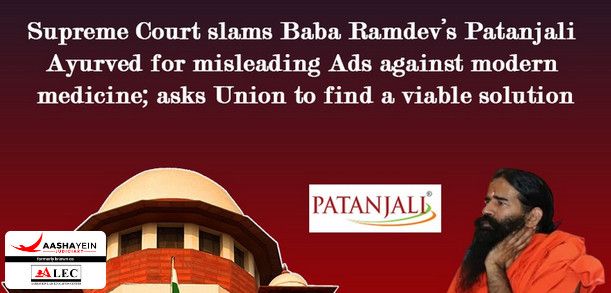Introduction:
In recent developments, Baba Ramdev and his close associate, Acharya Balakrishna, are facing legal challenges over misleading advertisements related to their products from Divya Pharmacy, an affiliate of Patanjali Ayurved. The Kerala Judicial First Class Magistrate Court issued a bailable warrant against the two for allegedly violating the Drug and Magic Remedies (Objectionable Advertisement) Act, 1954. This case has gained widespread attention due to the nature of the allegations and its potential impact on the credibility of Patanjali Ayurved and its influential founders.
Background of the Case:
The legal battle stems from complaints filed by a drug inspector in Palakkad, Kerala. The complaint alleged that the advertisements promoted by Patanjali Ayurved and its products, particularly from Divya Pharmacy, made false and misleading claims about the medicinal properties of the products. These claims purportedly suggested that their products could cure diseases without substantial scientific evidence to back such assertions.
The Kerala court issued a bailable warrant after the complainant, a local drug inspector, approached the court. It is important to note that the court's order was based on violations of sections 3(d) and 7(a) of the Drug and Magic Remedies (Objectionable Advertisement) Act, which deals with the regulation of advertisements that make fraudulent claims about medicines and their healing abilities.
You can also read the latest judgment by visiting [Latest Judgment].
For more information, visit [Aashayein Enquiry Section]
The Legal Framework: Drug and Magic Remedies Act, 1954
The Drug and Magic Remedies (Objectionable Advertisement) Act, 1954 was enacted to regulate advertisements concerning medicines and drugs that claim to treat or cure diseases without sufficient evidence or scientific validation. Specifically:
- Section 3(d) prohibits any advertisement that makes misleading claims about the curative or therapeutic effects of a drug, especially those related to serious diseases.
- Section 7(a) provides for penalties if someone publishes or broadcasts an advertisement that makes unsubstantiated medical claims that may mislead the public or cause harm.
In the case of Patanjali Ayurved, the allegations focus on advertisements that suggest its products can treat diseases like diabetes, cancer, and even COVID-19, without credible scientific backing.
Previous Legal Scrutiny of Patanjali Ayurved
This is not the first time Patanjali Ayurved has been under legal scrutiny for its advertisements. The Indian Medical Association (IMA) had previously moved the Supreme Court regarding the misleading advertisements of Patanjali products. The Court issued a contempt notice against Baba Ramdev and Acharya Balakrishna, highlighting the importance of ensuring that advertisements, particularly those related to health and medicine, are factual and substantiated with evidence.
In one high-profile case, Patanjali was accused of making false claims about its Coronil product, which was advertised as a cure for COVID-19. The Supreme Court had issued a temporary ban on such advertisements, and Baba Ramdev and Acharya Balakrishna were asked to publicly apologize and correct their earlier statements.
Precedents and Judicial Oversight
The case involving Baba Ramdev and Acharya Balakrishna is reflective of a larger issue concerning misleading advertisements in India. Over the years, the courts have been increasingly vigilant in scrutinizing advertisements that promote health claims without scientific validation. Notably:
- The Supreme Court of India has repeatedly emphasized the need for empirical evidence to back claims made in the marketing of medical products.
- Other cases involving misleading medical claims (like those related to weight loss, cancer cures, etc.) have set precedents for stricter enforcement of laws regulating health-related advertisements.
The judicial oversight of Patanjali Ayurved’s advertisements reinforces the need for companies to maintain transparency and honesty in their marketing practices. False or exaggerated health claims can not only harm consumers but also lead to public distrust in traditional medicine and Ayurveda, which have long been regarded as integral parts of India’s heritage.
Conclusion
The case against Baba Ramdev and Acharya Balakrishna serves as an important reminder of the legal boundaries surrounding the advertisement of medicinal products. While Patanjali Ayurved and its founders have popularized Ayurveda in India and abroad, they now find themselves under intense legal scrutiny for promoting products with claims that are not adequately supported by scientific evidence.
The outcome of this case will likely set a precedent for future regulations governing the advertisement of health products in India. It also highlights the crucial role of the judiciary in ensuring that businesses, especially those in the healthcare sector, uphold ethical standards and do not mislead the public for commercial gain.
As the February hearing approaches, it will be interesting to see how the court addresses the allegations and whether it imposes stricter guidelines on the promotion of Ayurvedic medicines in the future.

